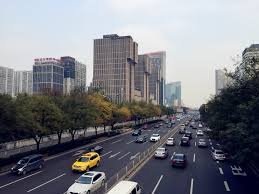Capitalism Down the Interstate
I was in grad school when a professor asked, "What metaphor would you use to describe how power structures stay intact?" We were studying Faucoult and had come to his explanation of how individuals give up their power to others, with his example of a moving ship and how everyone does their part to keep the ship moving forward and are in fear of what would happen if the ship stopped moving. I agree with Faucoult's analogy. It makes sense in most situations. In a modern context though, I'm thinking more along the lines of interstates. I'm about to head to Santa Fe, New Mexico from Tahlequah, Oklahoma next week. My oldest son is graduating from the Santa Fe Indian School. I've spent a lot of time on I-40 over the years. I grew up between Tahlequah and Lawton, OK, but moved out to Santa Fe, NM and spent 10 years out there before moving back to Tahlequah. My oldest three kids grew up out there.Staring at that road for long periods gives you opportunity to contemplate life's many questions. Not that I need to stare at a road to do that. My brain is hardwired for such reflection so a cup of coffee is enough to get me going. But as I've thought about the above question over the years I've attempted to apply several different metaphors to better grasp power dynamics in group formations.
I'm about to head to Santa Fe, New Mexico from Tahlequah, Oklahoma next week. My oldest son is graduating from the Santa Fe Indian School. I've spent a lot of time on I-40 over the years. I grew up between Tahlequah and Lawton, OK, but moved out to Santa Fe, NM and spent 10 years out there before moving back to Tahlequah. My oldest three kids grew up out there.Staring at that road for long periods gives you opportunity to contemplate life's many questions. Not that I need to stare at a road to do that. My brain is hardwired for such reflection so a cup of coffee is enough to get me going. But as I've thought about the above question over the years I've attempted to apply several different metaphors to better grasp power dynamics in group formations. The rules of road can be transferred to the subtle social rules subconsciously agreed upon between group members. As I sit behind the wheel and watch the road pass me by, I'm constantly aware of the rules of road and which will keep me safe. When you're going 75 mph or more you pay close attention to what's going to keep you safe.It's not that I'm always going to abide by those rules. I'll speed anywhere from five to fifteen miles over the speed limit, as long as there are no police officers around. And I'll not use a blinker if there are no other vehicles around. Things that make sense to me but don't coincide with the established rules.It's not that we've all agreed to abide by these rules. It's that we've all chosen to utilize the road. Psychologically we feel it's the safest way to get where we are going. If at the onset we chose to use the system, then we agree to give our power to it. If we're driving and we find there are certain people who are getting special treatment and are not penalized or people who are traveling in worse or better vehicles, we expect the rules of the road or the people who enforce those rules to make things right. We expect people who have already given over their power to the system to change the system.
The rules of road can be transferred to the subtle social rules subconsciously agreed upon between group members. As I sit behind the wheel and watch the road pass me by, I'm constantly aware of the rules of road and which will keep me safe. When you're going 75 mph or more you pay close attention to what's going to keep you safe.It's not that I'm always going to abide by those rules. I'll speed anywhere from five to fifteen miles over the speed limit, as long as there are no police officers around. And I'll not use a blinker if there are no other vehicles around. Things that make sense to me but don't coincide with the established rules.It's not that we've all agreed to abide by these rules. It's that we've all chosen to utilize the road. Psychologically we feel it's the safest way to get where we are going. If at the onset we chose to use the system, then we agree to give our power to it. If we're driving and we find there are certain people who are getting special treatment and are not penalized or people who are traveling in worse or better vehicles, we expect the rules of the road or the people who enforce those rules to make things right. We expect people who have already given over their power to the system to change the system. What's peculiar is once we've started on a singular path, mimesis keeps us locked into the system. We can pass all this landscape and watch as potential for freedom passes us by at every second of the day and we can still choose to follow the rules of the road. Why? Because these roads give us options. We can turn left and right and follow whatever road we want. The system is what gives us our options. The system lays out the roads. Social psychology dictates that we cannot desire solely on our own. Let me say that again: We cannot desire solely on our own. We know what to do for basic survival, like eat, drink, and find shelter. Once those basic needs are taken care of, people do not know what to do with themselves. We need other people to tell us what to desire. We need options. The roads are paved and laid out in front of us before we are born.The current corporate philanthropic venture of supporting "cradle to career" programs speaks best to how human programming works. We are taught from infancy to build certain characteristics, the rich have creative freedom while the poor learn rote behavior, but both are geared toward "staying on the road" and "maintaining the road as the only viable option."Parents want the best for their children (I should know I have six) so we teach our children those characteristics and believe this is the best modality for survival. What we don't consider is that we--ourselves--have been trained to desire the system we've been born in. It doesn't necessarily mean it's the best. It just means it's what we know. We get hints of that when we see certain people of certain communities mangled in crashes alongside the road. In disproportionate numbers. But we are so bought into the system, we assume the police are going to do the right thing and take care of those people and somehow the rules of the road will keep everyone safe. And we just keep driving by. Never taking action ourselves to stop and help. And we teach our children to do the same.
What's peculiar is once we've started on a singular path, mimesis keeps us locked into the system. We can pass all this landscape and watch as potential for freedom passes us by at every second of the day and we can still choose to follow the rules of the road. Why? Because these roads give us options. We can turn left and right and follow whatever road we want. The system is what gives us our options. The system lays out the roads. Social psychology dictates that we cannot desire solely on our own. Let me say that again: We cannot desire solely on our own. We know what to do for basic survival, like eat, drink, and find shelter. Once those basic needs are taken care of, people do not know what to do with themselves. We need other people to tell us what to desire. We need options. The roads are paved and laid out in front of us before we are born.The current corporate philanthropic venture of supporting "cradle to career" programs speaks best to how human programming works. We are taught from infancy to build certain characteristics, the rich have creative freedom while the poor learn rote behavior, but both are geared toward "staying on the road" and "maintaining the road as the only viable option."Parents want the best for their children (I should know I have six) so we teach our children those characteristics and believe this is the best modality for survival. What we don't consider is that we--ourselves--have been trained to desire the system we've been born in. It doesn't necessarily mean it's the best. It just means it's what we know. We get hints of that when we see certain people of certain communities mangled in crashes alongside the road. In disproportionate numbers. But we are so bought into the system, we assume the police are going to do the right thing and take care of those people and somehow the rules of the road will keep everyone safe. And we just keep driving by. Never taking action ourselves to stop and help. And we teach our children to do the same. The more times you stop. The more you are no longer afraid of the wilderness. The more you will change mimesis. We can show people how to travel off the beaten path by our own actions. If social psychology is correct and we do not know how to desire solely on our own, then it is up to us to show people how to desire a different direction. More importantly, show people there is nothing to be afraid of. Fear confines us to the rules of the road. But to be fearless, stop the vehicle, and take steps into the wilderness can give us options we've never conceived . Who knows? Maybe those options won't leave anyone mangled. The road we're on has historically proven there will always be victims. Break away and do something different. Step away from the "ho-hum it's been done," and reconstruct mimetic design.
The more times you stop. The more you are no longer afraid of the wilderness. The more you will change mimesis. We can show people how to travel off the beaten path by our own actions. If social psychology is correct and we do not know how to desire solely on our own, then it is up to us to show people how to desire a different direction. More importantly, show people there is nothing to be afraid of. Fear confines us to the rules of the road. But to be fearless, stop the vehicle, and take steps into the wilderness can give us options we've never conceived . Who knows? Maybe those options won't leave anyone mangled. The road we're on has historically proven there will always be victims. Break away and do something different. Step away from the "ho-hum it's been done," and reconstruct mimetic design.
Support a Native owned Etsy shop, Allies United, where I offer unique merch for allies of social justice movements, like MMIW, Native Lives Matter and Black Lives Matter. Take a look inside my Etsy shop here: etsy.com/shop/AlliesUnited.
(Works Cited: The images were borrowed from Wikimedia Commons, PxHere, nps.gov, and Wikipedia.)